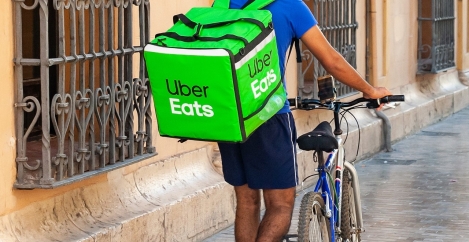January 31, 2020
Uber workers cling to “precarious” existence
 Policy makers should resist claims by Uber that its drivers fall into a middle ground between traditional employees and independent contractors, a new study says. The research report, Profits Uber Everything?, by Rotterdam School of Management, Erasmus University, examines Uber’s argument that its drivers are “independent workers” who are, in some respects, like individuals working for others and in other respects are like independent businesses. The company is only trying to establish this new category to exonerate itself of any responsibility for the workers, the researchers claim.
Policy makers should resist claims by Uber that its drivers fall into a middle ground between traditional employees and independent contractors, a new study says. The research report, Profits Uber Everything?, by Rotterdam School of Management, Erasmus University, examines Uber’s argument that its drivers are “independent workers” who are, in some respects, like individuals working for others and in other respects are like independent businesses. The company is only trying to establish this new category to exonerate itself of any responsibility for the workers, the researchers claim.
The research follows another recent study, which suggested that those who work only occasionally in the gig economy should be treated as genuine independent contractors, rather than being classified as employees with full employment rights. Later this year, the UK Supreme Court will hear Uber’s appeal against a string of decisions that its drivers are workers, with some employment rights, and are not truly independent.
Uber argues that because gig workers can have multiple apps running simultaneously, this makes it hard to attribute their hours to a single employer and means they are not employees. However, the latest research points out that Uber actively controls its drivers, even during “idle” time, as they are expected to accept a ride within 15 seconds without knowing the exact location or fee, or risk being fired.
“Financial hardships”
[perfectpullquote align=”right” bordertop=”false” cite=”” link=”” color=”” class=”” size=””]These independent workers become, we argue, so-called ‘precarious’ workers—a new category of workers who cling precariously to temporary but largely low-paid jobs with no benefits.”[/perfectpullquote]
“While no doubt some of the casual drivers for the likes of Uber, or indeed Deliveroo or Foodora, value the additional income and the flexibility that these companies offer, there is still a sizable proportion of people who drive for Uber or participate in the gig economy because of financial hardships and a lack of full-time employment options”, the researchers, Professor Magdalena Cholakova and Professor Joep Cornelissen, write. “While Uber’s business model, as a sharing platform, is supposed to help empower these disadvantaged workers by providing access to additional income… considering them as ‘independent workers’ does in fact only aggravate their plight. These independent workers become, we argue, so-called ‘precarious’ workers—a new category of workers who cling precariously to temporary but largely low-paid jobs with no benefits.”
Political and legal support for Uber’s position would allow it to continue to evade giving reasonable pay and providing support such as social security and training, the researchers argue. In the UK, the government-commissioned “Taylor Review of Modern Working Practices” recommended a fourth employment status category of “dependent contractor” for gig economy workers to sit alongside “employee”, “worker” and “independent contractor”. However, the government rejected this suggestion in 2018.
Uber is not the only gig economy platform to claim that its workers do not fit neatly into existing employment categories. In 2019, Hermes and the GMB union agreed that couriers who opted to become “self-employed plus” would receive certain benefits such as paid holiday in return for accepting greater control by Hermes and giving up premium pay rates.













